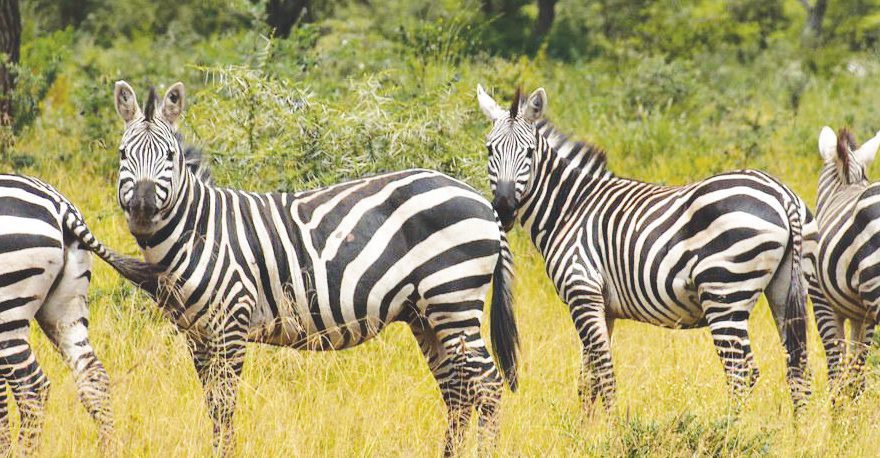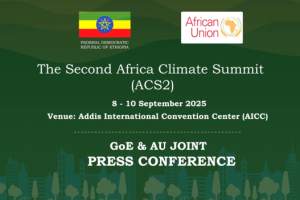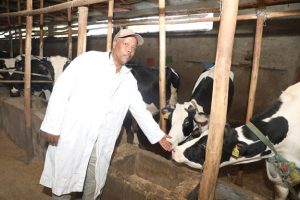
Since the past couple of months Ethiopia’s Borana Zone of Oromia State has been affected by drought due to lack of rainfall. The drought so far is affecting the lives of animals, both domestic and wild animals in the area. The drought is currently expanding to some parts of the Somali Regional State of Ethiopia which continues its impacts on livestock and livelihood of the pastoralist community.
Speaking to Ethiopian Press Agency, Borana Zone Administrator, Jarso Boru stated this week that due to lack of rainfall for several months in the area, severe drought is affecting Borana Zone and is predicted to continue up to four months. Jarso stated that though human lives were saved by the efforts of the government and other donor organizations with continued aid, the drought has caused severe damages on the livestock due to scarcity of water, fodder and grazing lands in the area.
The Zonal Administrator noted that so far more than 84 thousand livestock in the zone have perished due to the drought while more than 100 thousand livestock is in critical condition and need urgent supports. He has called on federal, regional governments and other donors to give due attention to control the impacts of the drought since the problem has continued.
Similar to the attention given for the protection and caring of humans and livestock in the drought-affected zone, animal rights activists are calling to give due attention to the protection and caring of wildlife in the Borana zone by providing necessary food, water services and by protecting the Borana National Park from unnecessary penetration to the protected area which includes the Yabelo Wildlife Sanctuary.
Approached by The Ethiopian Herald, Climate Activist Yared Abera said that to save wild animals from the effects of severe drought especially in National Parks, the first action is protecting the park from unplanned penetrations since people in the area are forced to use it to save their livestock in search of grass. By protecting the home of the wild animals, the second step must be following the wild animals’ situation, providing water in the park and if necessary additional foods.
Unless necessary protection is being held, the protected wild animals may be forced to move to other places for survival. Hence, the park should strengthen caring and protecting the animals.
The Borana National Park is home to different wild animals, some of them being endemic animals found only in the zone. The wild animals in the park are mammals, amphibians and birds in addition to different tree species which protect the ecosystem of the area.
Established in 2013, by developing the Yabello Wildlife Sanctuary, Borana National Park covers around 3,740 square care meters having five different blocks with different wild species. The park is home to Zebras (living only in Borana Zone and limitedly in Afar areas in Ethiopia), lions, elephants, giraffes and over 40 mammals. In addition, the park is the home of over 286 species of birds, four of which are endemic birds found only in the park, Park’s head said.
Approached by The Ethiopian Herald, Borana National Park Head Nigussie Wata said that the park is home to different animal species. Since it includes the Yabello Wildlife Sanctuary, Nigussie said, Borana National Park is among the animal species-rich parks found in lowland areas in East Africa region.
Nigussie reiterated that following recent year’s government attention to the protection and development of nature mainly following the national greening initiative campaign in 2019, the Borana National Park got attention and showed significant developments including in attracting visitors. But, currently, the area is affected by severe drought and the wild animals within and around the park need attention to save them from the impacts of the drought. Since wild animals are more resilient than livestock to drought and the park administration is following the wild animals in the park, so far there is no dead wild animal in the park, he noted.
“Our scouts are following the situation of the wild animals within the park and so far no wildlife is reportedly dead within the park due to the drought,” Nigussie said adding that “but, some wild animals are seen emaciating and losing their physical weights mainly Giraffe which is an indicator of the impact of the drought”
Hence, he said, the park’s administration with the zonal and Oromia Regional State administration are preparing to provide grass, fodder and other necessary foods to the wild animals.
In addition, the administration of the park jointly with the zonal administration and the people of the area are working to provide water access for the animals. Discussions are also continued with the people of the area, with local and regional administrations to implement proper mechanisms and to establish a committee to manage the drought’s effects on the wild animals in the park. “Unlike other developing society’s people, the Borana people give due protection and care for wildlife and are working hand-in-hand with the park administration to protect and save the wild animals” Nigussie noted adding “that helps to manage the drought’s effect on the wildlife till now.”
Due to the people’s attention to the park, up to now, the park is safe and protected. But, since the drought is severely increasing its impacts, there should be joint action to protect the wild animals in the park.
“There was a fear that following the drought, overgrazing may happen by penetrating the park’s holding by the people to save their livestock” the park’s administrator noted adding that “but, surprisingly the people in Borana zone are protecting the park as their resource and the wild animals in the park are in good condition,” he added.
It is predicted that the drought is expected to stay for the coming four months, the administrator said. Hence, to protect the wildlife in the park, coordinated efforts of governmental and non-governmental organizations is necessary. In this regard, governmental, private and donor organizations can provide supports like water reservoirs, fodder and other animal protection materials to save these endemic species in the Borana Natural Park, he added.
In addition to direct support to the park, Nigussie said, supporting the people of Borana should be strengthened. “If the people in the area are safe and get support, the people are the protectors of the park, hence supporting the people to minimize the impacts of the drought will, directly and indirectly, help to save the lives of the wildlife in Borana National Park,” Nigussie added. A severe shortage of pasture and water is a critical problem in the area and continuous support is needed in this regard both to the wildlife and livestock.
Speaking to a local media, Director of Oromia National Regional State, Wildlife Parks and Ecotourism, Mohamed Nur Jamal said that, of the East African zebra species that are only found in Ethiopia and Kenya, most of them are found in Borana National Park. He said the wildlife is facing a shortage of water due to the drought in the zone. He also said, “Although the animals are accustomed to drought in the zone and are more resilient than domestic animals, they facing water crises.”
Mohamed further stated that the grass and leaf within the park have lost their lives due to the drought and there is a shortage of water within the park. This affects the wild animals in the park to have access to water and food mainly the grass eating wild animals. The director added that there is a continuous follow-up to the wild animals in the park mainly in the provision of water. In addition to the park’s administration, the people in the area are providing water to the wild animals.
Due to this strong joint effort, so far no wild animal is dead or move to another place, Mohamed stated adding efforts will continue to protect the wild animals from the drought. There are efforts to install sustainable water access in the park, he added. Nigussie on his part said that there is no river in the area and that is the major problem of the park to have water access. Hence, access to water is the hot agenda of the park, adding concerned parts should give attention to providing sustainable water access to the park.
BY DARGIE KAHSAY
THE ETHIOPIAN HERALD DECEMBER 21/2021




